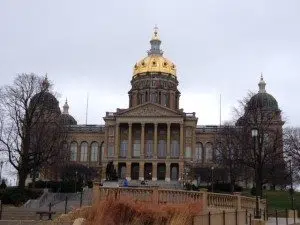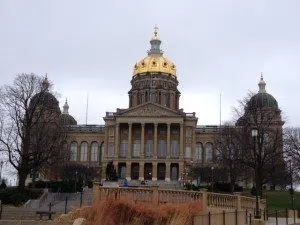(Des Moines) A House proposal would require Iowa voters to be registered with a political party one month in advance of that party’s caucuses or primary elections in order to participate.
House File 353 would require voters who want to participate in a party caucus or primary to be a registered member of the party at least 30 days before participating in the party’s nomination process. The measure would also prohibit a person from filing nominating papers to become a partisan candidate if the individual has not been a member of that party for at least a year. These requirements would not apply to first-time voters if they have not registered as a member of a political party.
Rep. Derek Wulf, R-Hudson, said he proposed the bill after discussions with constituents who expressed worries during the 2024 Republican caucuses about non-Republicans participating in the nomination process.
“There was a lot of concerns that came up of, you know, Democrats who were switching parties, and as they came into the caucus process,” Wulf said. “There was a lot of discussion around, ‘Was there going to be some sabotage efforts?’ I don’t know if we saw that widespread, but I know that concern came up.”
He said these provisions would help Iowa “maintain that integrity around the process of the caucus” and help keep the Iowa GOP caucuses first in the nation — an issue of consideration as the Democratic National Committee stripped Iowa of its first-in-the-nation spot leading into the 2024 presidential election cycle.
However, some speakers said the measure would hurt voters who choose to not affiliate with a political party or who vote based on specific issues. Amy Campbell with the League of Women Voters of Iowa said candidates should be evaluated on “qualifications, ideas and the support of voters, not arbitrary requirements like party registration.” She said the bill discriminates against nonpartisan voters or candidates who choose not to affiliate with a political party based on personal beliefs or dissatisfaction with the current political system.
Campbell said this bill also comes as more voters are shifting in allegiances based on specific candidates or based on disapproval of a political party’s decisions.
“I think we can all agree that (political) parties are in a state of transition right now,” Campbell said. “There is a lot of changing at the party level, where I know personally — my personal family, who are all registered Republicans … have changed parties back and forth depending on who the candidate is. And we really feel that it restricts political freedom and participation.”
Rosie Thierer, a poll worker in Mitchellville, said the bill could also expose those staffing Iowa elections to potential violence and harassment from voters who would be denied the ability to participate in some elections because of the 30-day party registration requirement.
“If you think about the place where you vote, you face a lot of workers like me, gray-haired, wrinkled old women,” Thierer said. “So think about exposing those individuals to the harassment that they will take. It will be verbal, it could be physical, and I ask you to think about the real enforcement of this — it will be those election workers.”
The measure moved forward for consideration by the full House State Government Committee, with Democrat Rep. Adam Zabner not signing off on the bill.
Rep. Austin Harris, R-Moulton, said though he signed off on the measure, he shared concerns brought up by Campbell about the measure restricting voters’ ability to participate in elections. In its current form, Harris said he would have a difficult time supporting the bill after the committee process.
“I actually agree with you, I think our political parties are changing,” Harris said. “I think we’re starting to bring more and more people into the fold. I think — whether it happens with the Republican Party and building a blue collar coalition, a lot of folks who are former Democrats coming in, I want them to be able to participate in a party and be a part of our party, as long as we continue to push the principles that we do.”
But Dennis Tibben with the Foundation for Government Accountability, a conservative public policy think tank, said he sees the measure as leading to a more informed electorate participating in primary elections and caucuses.
“We think that, through the additional information that the voters will be able to gain as a result of this legislation, ultimately we’ll see an increase in the number of individuals who are participating in the electoral process on the local level,” Tibben said.
Wulf said there could be changes to the time frames specified in the bill, but that he believes the measure will be a part of ongoing discussions on election integrity, especially as it relates to the Iowa caucuses.
“We want to make sure that we keep the … first-in-the-nation status on that for the Republican Party,” Wulf said. “For sure, disappointed that the Democrats no longer have that. But if we could get that back for them, I’d love that as well. So there’s a lot of discussion happening in general around elections, but specifically around the caucus process.”













